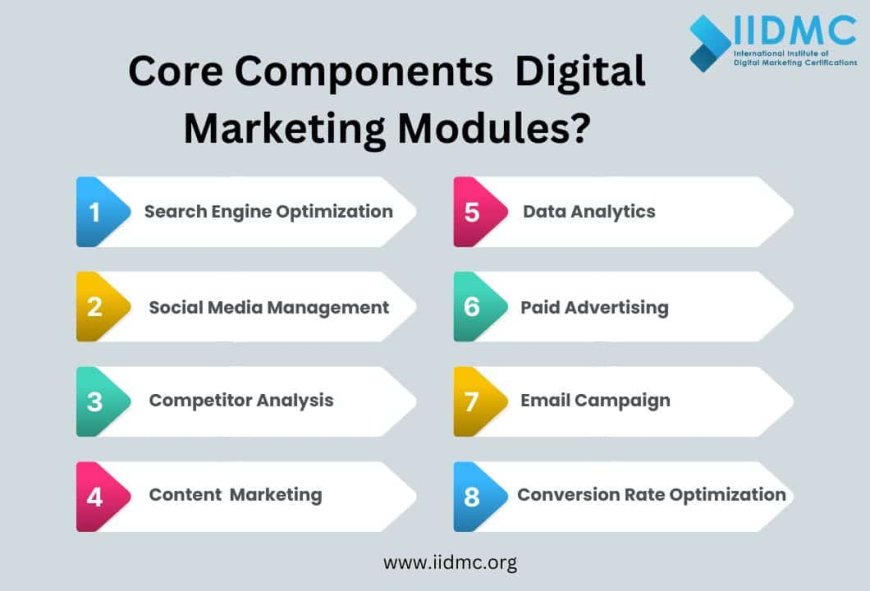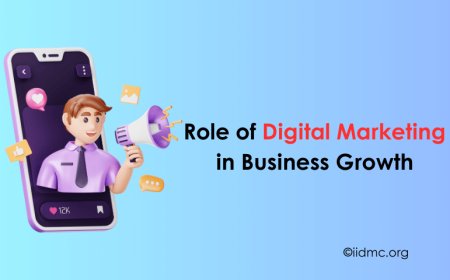Core Components of Digital Marketing Modules
Discover the essentials of digital marketing modules, covering strategies, tools, and techniques for successful online campaigns.

Digital marketing has become a transformative force, reshaping the way companies connect with their audience. The significance of digital marketing modules lies in their ability to navigate the intricate web of online platforms, reaching consumers in a targeted and impactful manner. These modules encompass a range of strategies, from search engine optimization (SEO) and social media marketing to email campaigns and content creation. Each module plays a crucial role in establishing brand presence, fostering customer engagement, and ultimately driving business growth.
Understanding the basics of digital marketing is crucial for creating successful strategies in today's competitive business world. It's more than just using online tools; it involves grasping the key elements that make campaigns work. These elements include things like figuring out your audience, using data, creating good content, and making sure the user experience is smooth. When businesses get how these pieces fit together, they can make campaigns that connect with their target audience, boost their brand, and get real results. Knowing these basics is the key to making the most out of digital marketing in the constantly changing online world.
Importance of digital marketing skills
-
Business Visibility: Digital marketing skills are vital for enhancing online presence, ensuring businesses can reach and engage with a broader audience in the digital space.
-
Targeted Campaigns: Proficiency in digital marketing enables professionals to create and implement targeted campaigns, tailoring messages to specific audiences and maximizing impact.
-
Data-Driven Decision Making: Skills in analytics and data interpretation empower marketers to make informed decisions, optimizing strategies based on real-time insights for better outcomes.
-
Adaptability: In fast-paced digital marketing, possessing digital marketing skills allows individuals to adapt to evolving trends and technologies, staying relevant in the dynamic online environment.
-
Business Growth: Ultimately, digital marketing skills serve as a fundamental toolkit for fostering business growth, helping individuals and organizations thrive in the competitive and ever-changing digital world.
Complexity arising from diverse digital marketing modules
Multifaceted Strategies:
The complexity arises from the need to employ a variety of strategies encompassed within different digital marketing modules. For instance, search engine optimization (SEO) requires a distinct set of tactics compared to social media marketing or email campaigns. Coordinating these strategies into a cohesive and effective overall plan becomes challenging, demanding a nuanced understanding of each module and the requisite skills for marketing.
Integration Challenges:
Bringing together diverse digital marketing modules poses challenges in terms of integration. Ensuring seamless coordination between various components is crucial for a consistent brand message and user experience. This integration complexity can result in issues such as disjointed communication and inconsistent brand representation across different channels, emphasizing the need for integrated skills for marketing professionals.
Skill Diversification:
Each digital marketing module demands specific skills and expertise. The complexity arises as professionals need to diversify their skill set to effectively manage and execute campaigns across multiple modules. Alternatively, organizations may need to foster collaboration between specialists in different areas to ensure comprehensive and successful strategies, underlining the importance of diverse skills for marketing roles.
Technologies:
The dynamic nature of digital technologies introduces complexity as marketers need to stay updated on the latest trends and tools. Adapting to new technologies promptly is essential for maintaining competitiveness, and the fast-paced evolution of the digital landscape adds layer of complexity to crafting and executing effective strategies, necessitating continuous learning and upskilling in skills for marketing professionals.
Data Management:
The abundance of data generated from various digital marketing modules can be overwhelming. Managing, analyzing, and extracting meaningful insights from diverse data sources require robust data management strategies. Effectively leveraging this data is vital for making informed decisions and optimizing future marketing efforts, showcasing the importance of data-centric skills for marketing practitioners.
Target Audience Variability:
Different digital marketing modules may cater to distinct target audiences with varying preferences and behaviors. Crafting messages and content that resonate with these diverse audiences requires a nuanced understanding of each segment, adding complexity to the content creation and messaging processes. Tailoring content to specific audience needs is a critical aspect of honing skills for marketing success.
Regulatory framework:
The digital marketing landscape is subject to a constantly changing regulatory environment, particularly concerning privacy and data protection. Staying compliant with diverse regulations across different modules is a complex task that demands continuous vigilance and adaptation to ensure ethical and legal practices in marketing efforts, highlighting the importance of regulatory awareness as part of the skills for marketing professionals.
What are the core components that make up effective digital marketing modules?
Understanding the core components of effective digital marketing modules is crucial for developing successful strategies.

Search Engine Optimization (SEO): The skill of optimizing digital content for search engines ensures higher visibility and ranking on search engine result pages, driving organic traffic.
Social Media Management: Proficiency in managing various social media platforms is vital for creating and maintaining a strong online presence, engaging with the audience, and building brand awareness.
Content Creation and Marketing: The ability to create compelling and relevant content tailored to the target audience is a fundamental skill. Content marketing involves strategically distributing this content to attract, inform, and retain customers.
Data Analytics: Skills in data analysis enable marketers to interpret and derive insights from the vast amount of data generated by digital marketing efforts. This informs decision-making, allowing for continuous optimization of strategies.
Email Campaign Management: Crafting effective email campaigns involves skills in segmentation, personalization, and strategic timing to maximize engagement and conversion rates.
User Experience (UX) Optimization: Understanding and enhancing the user experience on websites and digital platforms is essential for retaining visitors and converting leads into customers.
Paid Advertising: Proficiency in managing paid advertising campaigns, such as pay-per-click (PPC) and display ads, ensures effective budget allocation and targeted promotion to reach specific audiences.
Conversion Rate Optimization (CRO): Skills in optimizing website elements to increase the percentage of visitors who convert into customers contribute to the overall effectiveness of digital marketing efforts.
The core components encompass search engine optimization (SEO), social media management, content creation and marketing, data analytics, email campaign management, user experience optimization, paid advertising, and conversion rate optimization (CRO). The complexity arises from the multifaceted nature of these modules. Marketers face challenges in coordinating diverse strategies, integrating components seamlessly, diversifying skill sets, staying abreast of evolving technologies, managing abundant data, catering to variable target audiences, and navigating a constantly changing regulatory environment. . By mastering the core components and addressing the inherent complexities, individuals and organizations can position themselves for success in competitive digital marketing.





























